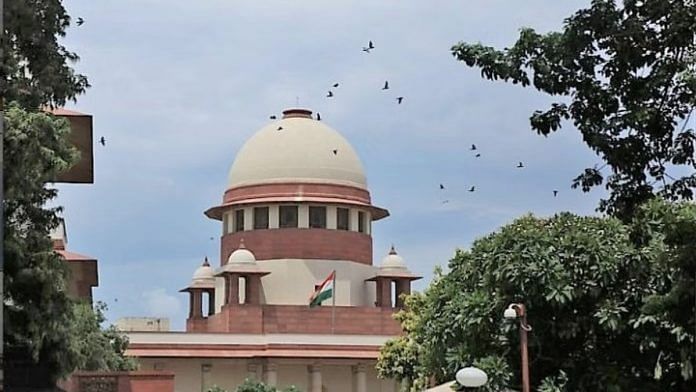New Delhi: The mandatory sharing of one’s location as a condition for bail may violate Article 21 of the Constitution, the Supreme Court remarked this week, in response to a challenge by a Nigerian national who is allegedly involved in a drugs case.
Justice Abhay S. Oka observed that this requirement could not be a bail condition. “We agree there are two instances where this court has done it, but it cannot be a condition for bail,” he said.
Justice Oka, along with Justice Ujjal Bhuyan, was hearing the Nigerian’s challenge to a Delhi High Court order that he would have to share his Google location PIN with his investigating officer.
The top court, which had asked Google to file an affidavit on the scope of the “Google PIN” — a feature that allows viewing of one’s live whereabouts — deemed this affidavit superfluous.
The bench reserved its decision Monday on whether the imposition of mandatory location sharing in bail applications was violative of the Constitution.
But it was firm in its view that the condition was “hit by Article 21”, which says the protection of life and personal liberty is a fundamental right.
The Nigerian’s challenge came in the context of courts requiring accused prisoners who seek bail to share their location with investigating authorities during the period they are out of prison.
Such a tracking measure was used for the first time by the Delhi High Court in August 2020 — at the onset of the Covid pandemic — citing “unprecedented circumstances of a public health emergency”. Since then, it has become a common and routine requirement.
Courts have continued to impose such conditions well after the pandemic settled. Notably, the Parliamentary Standing Committee of the Ministry of Home Affairs had suggested exploring cost-effective bracelets to be worn by accused to track their location.
Last January, the top court observed that bail conditions must not be excessive or onerous. Doubts have also been expressed whether sharing one’s location may be violative of the right to privacy. ThePrint explains.
Also read: SC says registered Hindu marriage invalid without requisite ceremonies. ‘Can’t trivialise process’
From murder to terrorism: sharing location is norm
Consider the case of Olympian and wrestler Sushil Kumar who has been accused in the murder of Sagar Dhankar in Delhi’s Chhatrasal stadium. He was arrested in May 2021.
Earlier this year, Kumar requested the district court at Rohini (Delhi) for bail to perform his father’s last rites. The district judge released him on humanitarian grounds on the condition of providing a personal bond and a guarantee.
The Rohini court also ordered Kumar to share his “live location as and when required” with the investigating officer as an additional condition for bail. This meant the court imposed a requirement of location on the demand of the police at any time.
While sharing of mobile phone locations is widely prevalent, the Jammu and Kashmir Police have pioneered the use of tracking anklets.
Last year, a National Investigation Agency (NIA) court in J&K required Ghulam Mohd Bhat, who was accused in the Udhampur terror financing case, to wear a GPS tracker anklet.
The NIA’s request was based on the importance of “close monitoring” and the permissibility of stringent restrictions under anti-terror legislation.
Similar conditions have also been imposed by the Punjab and Haryana High Court, most notably by Justice Anoop Chitkara, who has repeatedly required the accused to share their location and even forbidden them from deleting data from their mobile devices.
“Whenever the Investigating officer asks to share the location, the petitioner shall immediately do so. The petitioner shall neither clear the location history, WhatsApp chats, call logs nor format the phone without permission of the concerned SHO/I.O.”, the HC had said in a number of such cases.
The HC relied on a 2020 decision of the apex court that said courts may, unusually, impose “restrictive conditions” while granting bail, even though it had also noted that a balance must be struck between the liberty of an accused and a fair trial.
Constitution guarantees privacy
Article 21 of the Constitution guarantees an individual the right to life, which has been expanded to include the right to one’s privacy even though it is not explicitly mentioned in the document.
In the celebrated 2017 Puttaswamy case, the top court had recognised the right to privacy as an “intrinsic part” of the right to life and said that privacy formed a part of one’s dignity, autonomy, and liberty.
Explaining the ambit of privacy in law, the SC had said, “Privacy includes at its core the preservation of personal intimacies, the sanctity of family life, marriage, procreation, the home and sexual orientation. Privacy also connotes a right to be left alone….”.
Since then, privacy has become a central argument in Indian courts, with it being relied upon in cases such which had challenged the criminalisation of homosexuality and adultery.
(Edited by Tikli Basu)
Also read: Can I be declared a non-believer & refuse ‘anti-woman’ Sharia law, Muslim woman asks Supreme Court



